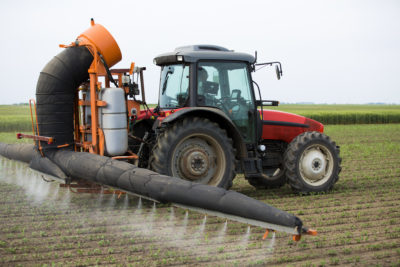
Overall, the amount of genetically modified organisms (GMOs) in our food is increasing steadily because of herbicide use and desiccation.
Herbicide use is changing both the food on your plate and the agriculture industry beyond recognition. Notably, Nautilus writer Miranda Hart calls one herbicide use “the biggest farming practice you’ve never heard of.”
Farmers are no longer drying crops out naturally at the end of the season, Hart reveals. Instead, farmers are killing all the plants in the fields with herbicide [1] in a process called desiccation.
Farmers are desiccating through herbicide use because it makes the fields easier to clear for planting. However, desiccation is altering crops because it kills every plant in the fields.
The Biggest Farming Practice You’ve Never Heard Of
“Desiccation may be the most widespread farming practice you’ve never heard of,” Hart writes.
In addition, “chances are that most of what you ate today was harvested using a desiccant (herbicide), but you’d never know,” Hart observes.
Therefore, herbicide use is completely changing both crops and farming. In fact, farmers are planting more genetically engineered seeds because of desiccation.
Herbicide Use Is Increasing The Amount Of GMOs In Our Food
Significantly, seed companies introduced five new varieties of “shatter-resistant” canola seeds in Canada in 2017, Hart declares. To clarify, canola or rapeseed [2] is the plant from which they make Canola oil. In particular, rapeseed is one of Canada’s biggest crops.
Overall, the amount of genetically modified organisms (GMOs) in our food is increasing steadily because of herbicide use and desiccation. As a result, any food made with or cooked in canola oil probably contains these GMOs.
For example, one reason that farmers desiccate through herbicide use is to eliminate all the non-GMO plants from their fields. This procedure enables farmers to make more money by planting only higher-yield GMO crops.
The Level Of Herbicide Use By Farmers Is Incredible
The volume of herbicide use by farmers is growing each day. By and large, the figures for herbicide use are frightening.
To illustrate, companies are selling 400 licensed herbicides in one Canadian province, Ontario. Given these circumstances, Hart believes farmers are saturating their crops in herbicides.
Farmers’ use of one herbicide, glyphosate [3] (marketed as RoundUp in the U.S.), increased by 637% between 2005 and 2014. In detail, merely 3,200 tons of glyphosate were used worldwide in 1974. Nevertheless, analysts project that global glyphosate use will reach one million tons in 2020.
Additionally, glyphosate is an herbicide that the World Health Organization (WHO) has declared to be a possible carcinogen. Ultimately, a carcinogen is a chemical that causes cancer.
Glyphosate is one of the main herbicides that farmers use in desiccation, Hart notes. Furthermore, Hart believes the dissemination of glyphosate has increased dramatically due to how common the practice of desiccation has become.
Glyphosate Is In Our Food
Widespread herbicide use means the food on our plates and in our supermarkets contains glyphosate. For example, 30% of 3,200 food products contain glyphosate, the Canadian Food Inspection Agency asserts.
The Environmental Protection Agency (EPA) reports that the levels of glyphosate in American food increased by 1,000% between 1993 and 2015. This figure should concern all of us greatly because nobody knows what glyphosates do to humans.
Specifically, glyphosates could be killing the beneficial microbes in your digestive system. Researcher Deanna Gibson of the University of British Columbia worries about what glyphosates are doing to our digestive tracts.
“It’s shocking to me that the chemicals we feed to lab mice to disrupt gut function are actually common herbicides—like glyphosate,” Gibson notes.
Notably, neither the EPA nor the World Health Organization is studying glyphosate’s effects on gut functions. So, nobody really knows what herbicide use is doing to our digestive tracts. Nonetheless, you could be getting more upset stomachs and heartburn because of glyphosate.
All in all, nobody knows how much glyphosate is being used, Hart observes. No agency is currently keeping track of the level of glyphosate use.
Herbicide Use Is Exposing You To Neurotoxins
Moreover, herbicide use is exposing your food to dangerous chemicals such as neurotoxins and endocrine disruptors. Consequently, herbicides could be causing many more health problems than we are even aware of.
In essence, a neurotoxin is a chemical that kills brain cells. Endocrine disruptors are chemicals that interfere with your hormones or endocrine system.
Particularly, chemicals used in desiccation contain both neurotoxins and endocrine disruptors, Hart states. Furthermore, the EPA is not evaluating desiccation chemicals called adjuvants for safety.
Changing Agriculture Beyond Recognition
Herbicide use and desiccation are changing agriculture beyond recognition, Hart claims. She thinks farmers are now planting larger fields because of desiccation.
Farmers did not start desiccating until recent years because desiccation shatters seedpods. Yet, genetically engineered crops with shatter-resistant seedpods make it very easy to desiccate. For this reason, desiccation encourages the use of GMOs on farms.
Herbicide use is also increasing because of new herbicide-resistant weeds. So, farmers are ironically creating superweeds with herbicide use.
“If you blast a weed with herbicide, eventually its cells become resistant,” Hart writes. “Farmers are left with fields of weeds they can’t kill.”
Because of this, farmers are spraying more and more herbicide. Farming then gets more expensive and farms get bigger because of increased herbicide use.
Making Farms A “Dystopia”
“The scene was from some dystopia [4],” Hart exclaims concerning a visit to a farm in the Canadian province of Saskatchewan. “I knew agriculture had changed, but I couldn’t have imagined this scene so divorced from the mom and pop farms of my childhood.”
Miranda Hart is an ecologist and professor at the University of British Columbia. She penned a recent Nautilus article [1] that will hopefully encourage organic gardening and a departure from unsavory farming practices.
You may also enjoy reading an additional Off The Grid News article: Does Your Breakfast Cereal Contain Toxic Weed-Killer Glyphosate? [5]
What do you make of herbicide use today and how it affects our food? Let us know in the comments below.